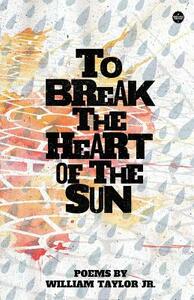Take a photo of a barcode or cover
As usual my San Francisco Tenderloin doppelganger, William Taylor Jr. knocks it outta the park with another excellent collection of poems. About the only negative thing I think one can say about Bill Taylor's books is that he's kind of writing the same poem over and over again--I've heard the man himself lament this. And yet, that too appears to be an unavoidable part of the point of what he has to say, which I find so beautiful and important. Having killed God I think all we have to take it's place is eternal return. These poems, as in his other books, are largely about the joys and sorrows of survival. And survival, in this post-capitalist urban jungle, is about getting up in the morning, working, getting three square meals, having a drink maybe, listening to a record or two before bed, and doing these things on daily repeat until the big sleep takes our tattered bodies away.
Just to point out a single example--a notable poem--of this theme, I really loved "Fuck the Dead." While so many of the poems encourage us to appreciate a fleeting joy, a beauty or pleasure we may well miss in our bumpy Muni ride to the DMV, this one was rather about how uselessly we rage against most so-called consolations: writing, love, suffering, and human company until simple exhaustion leads us back to falling in love, to writing another poem, to getting by despite the horror of our alienation and solitude.
Another poem that really got me in this collection was "Me and the Heart." I loved it because it made me feel ashamed. Writing, after all, is a vocation. "Me and the Heart" made me question whether I'd lived up to the calling, whether I was worthy of declaring myself a writer. The heart is only a projection of the mind, I think. This is language, after all, and language is the mind's beginning and ending--or at least where most thoughts are born, live, and the medium through which they're passed on to others. Languages therefore creates and frames even the more physical, visual forms of art, like sculpture, architecture, or painting. Language is a kind of dwelling place. Even so, even within language's use we sometimes escape it with that thing we call sense or logic, which so often chains language to a single sense. (Some call this spin. Or just yelling. or politics.) This bastardized use of language, another poet friend of mine would tell me, is merely prose--and that's why poetry is sacred. I've spent much of my writing life trying to prove this friend wrong about prose and to bring the sacred heart of poetry into my stories and novels--fluidity, ambiguity, color, emotion, and a wonder in the face of such a universe. But doubt assails me at every turn. And this particular poem reminded me to stay on the straight and narrow path of the heart, the spirit of poetry, the words that spit on manifesti, occupational manuals, and the reason that builds concentration camps.
Yeah, I thought this was even better than his last collection--to which I also gave 5 stars.
Just to point out a single example--a notable poem--of this theme, I really loved "Fuck the Dead." While so many of the poems encourage us to appreciate a fleeting joy, a beauty or pleasure we may well miss in our bumpy Muni ride to the DMV, this one was rather about how uselessly we rage against most so-called consolations: writing, love, suffering, and human company until simple exhaustion leads us back to falling in love, to writing another poem, to getting by despite the horror of our alienation and solitude.
Another poem that really got me in this collection was "Me and the Heart." I loved it because it made me feel ashamed. Writing, after all, is a vocation. "Me and the Heart" made me question whether I'd lived up to the calling, whether I was worthy of declaring myself a writer. The heart is only a projection of the mind, I think. This is language, after all, and language is the mind's beginning and ending--or at least where most thoughts are born, live, and the medium through which they're passed on to others. Languages therefore creates and frames even the more physical, visual forms of art, like sculpture, architecture, or painting. Language is a kind of dwelling place. Even so, even within language's use we sometimes escape it with that thing we call sense or logic, which so often chains language to a single sense. (Some call this spin. Or just yelling. or politics.) This bastardized use of language, another poet friend of mine would tell me, is merely prose--and that's why poetry is sacred. I've spent much of my writing life trying to prove this friend wrong about prose and to bring the sacred heart of poetry into my stories and novels--fluidity, ambiguity, color, emotion, and a wonder in the face of such a universe. But doubt assails me at every turn. And this particular poem reminded me to stay on the straight and narrow path of the heart, the spirit of poetry, the words that spit on manifesti, occupational manuals, and the reason that builds concentration camps.
Yeah, I thought this was even better than his last collection--to which I also gave 5 stars.
